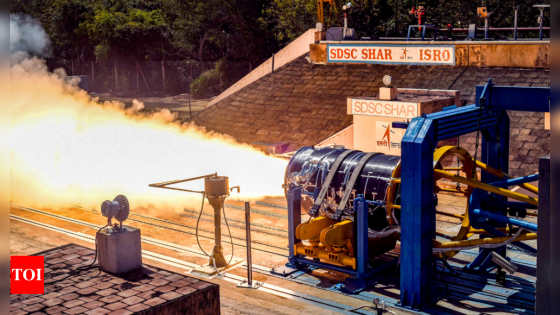HYDERABAD: Continuing its trajectory towards the launch of its first orbital launch vehicle – Vikram-1, Hyderabad-based space-tech startup Skyroot Aerospace has successfully test-fired stage-2 of the rocket at the propulsion testbed of the Indian Space Research Organisation (ISRO) at Satish Dhawan Space Centre (SDSC) in Sriharikota of Andhra Pradesh on March.
The test, which took place on Wednesday, lasted 85 seconds and recorded a peak sea-level thrust of 186 kilonewtons (kN), which is expected to result in a fully expanded vacuum thrust of around 235kN during flight, Skyroot said.
The stage-2 engine, called Kalam-250, features a high-strength carbon composite rocket motor utilizing solid fuel and a high-performance Ethylene-Propylene-Diene terpolymers (EPDM) thermal protection system (TPS).
It also incorporates a carbon ablative flex nozzle and high-precision electro-mechanical actuators for thrust vector control, which helps in achieving the desired trajectory, Skyroot added.
Stage-2 is crucial in propelling the launch vehicle from the atmospheric phase into the deep vacuum of outer space, it added.
Skyroot co-founder & CEO Pawan Chandana said the successful testing of Kalam-250 marks a significant milestone for the Indian space industry.
“All test parameters are within the expected range, bringing us closer to the upcoming orbital launch of the Vikram-1 rocket,” Chandana said, pointing out this marks the testing of the largest propulsion system ever designed and manufactured by the Indian private sector and that Kalam-250 was the first carbon-composite-built motor to be tested at ISRO.
“In this crucial test, we validated the flex nozzle control system during firing for the first time, a significant milestone in our journey towards the maiden orbital launch of Vikram-1 in 2024. We are focused on achieving our upcoming milestones with the dedication of our team and the support from IN-SPACe and ISRO,” added Naga Bharath Daka, co-founder and COO, Skyroot.
The test, which took place on Wednesday, lasted 85 seconds and recorded a peak sea-level thrust of 186 kilonewtons (kN), which is expected to result in a fully expanded vacuum thrust of around 235kN during flight, Skyroot said.
The stage-2 engine, called Kalam-250, features a high-strength carbon composite rocket motor utilizing solid fuel and a high-performance Ethylene-Propylene-Diene terpolymers (EPDM) thermal protection system (TPS).
It also incorporates a carbon ablative flex nozzle and high-precision electro-mechanical actuators for thrust vector control, which helps in achieving the desired trajectory, Skyroot added.
Stage-2 is crucial in propelling the launch vehicle from the atmospheric phase into the deep vacuum of outer space, it added.
Skyroot co-founder & CEO Pawan Chandana said the successful testing of Kalam-250 marks a significant milestone for the Indian space industry.
“All test parameters are within the expected range, bringing us closer to the upcoming orbital launch of the Vikram-1 rocket,” Chandana said, pointing out this marks the testing of the largest propulsion system ever designed and manufactured by the Indian private sector and that Kalam-250 was the first carbon-composite-built motor to be tested at ISRO.
“In this crucial test, we validated the flex nozzle control system during firing for the first time, a significant milestone in our journey towards the maiden orbital launch of Vikram-1 in 2024. We are focused on achieving our upcoming milestones with the dedication of our team and the support from IN-SPACe and ISRO,” added Naga Bharath Daka, co-founder and COO, Skyroot.
Source Agencies



